Air Conditioning
Busting Myths: The Truth About Energy-Saving AC Heat Pumps

We are here to dispel the myths about energy-efficient air conditioning heat pumps.
Did you know that heat pumps can save up to 50% on heating costs compared to traditional systems?
In this article, we’ll provide you with the truth and facts about the energy efficiency, cost savings, noise levels, and performance of AC heat pumps.
Whether you’re concerned about installation or maintenance, we’ve got you covered.

Get ready to discover the real benefits of energy-saving AC heat pumps.
Key Takeaways
- Energy-saving AC heat pumps transfer heat from inside to outside and vice versa, saving money on energy costs by moving heat instead of generating it.
- AC heat pumps provide long-term savings on energy bills and reduce greenhouse gas emissions and carbon footprint.
- Install programmable thermostats, optimize temperature settings, schedule annual maintenance, properly insulate your home, and use ceiling fans to maximize the efficiency of energy-saving AC heat pumps.
- Energy-efficient AC heat pumps reduce greenhouse gas emissions, consume less energy compared to traditional heating methods, and offer long-term savings and sustainability.
How Energy-Saving AC Heat Pumps Work
We know how energy-saving AC heat pumps work by efficiently transferring heat from inside our homes to the outside. These innovative systems use a refrigeration cycle to extract heat from the indoor air and transfer it to the outdoor environment. By reversing this process, they can also provide cooling during hot weather.
Heat pumps rely on a compressor, condenser, evaporator, and expansion valve to facilitate the heat transfer process. One of the key benefits of using heat pumps is their ability to save money on energy costs. Unlike traditional heating systems that generate heat, heat pumps simply move it from one place to another, making them highly efficient.
This efficiency is especially advantageous in cold climates, where heat pumps can still extract heat from outside air, even at low temperatures, providing reliable and cost-effective heating for homes.

Common Myths About Energy Efficiency in AC Heat Pumps
When it comes to energy efficiency in AC heat pumps, there are several common myths that need to be debunked.
First and foremost, energy-saving AC heat pumps aren’t only cost-effective solutions but also provide long-term savings on energy bills.
Additionally, these heat pumps offer environmental benefits by reducing greenhouse gas emissions and minimizing the overall carbon footprint of a building.
It’s important to address these misconceptions and provide accurate information to help consumers make informed decisions about energy-saving AC heat pumps.

Cost-Effective Energy-Saving Solutions
One of the most cost-effective energy-saving solutions for AC heat pumps is installing programmable thermostats. These devices allow you to set specific temperature schedules, ensuring that your AC heat pump operates efficiently and only when needed.
Here are four energy-saving tips that can help you reduce your electricity bills:
-
Optimize temperature settings: Set your programmable thermostat to higher temperatures when you’re away from home or asleep. This can significantly reduce energy consumption without sacrificing comfort.
-
Regular maintenance: Schedule annual maintenance for your AC heat pump to ensure it operates at peak efficiency. This includes cleaning or replacing filters, checking refrigerant levels, and inspecting electrical connections.

-
Proper insulation: Insulate your home properly to reduce heat transfer, keeping the cool air inside during summer months. Adding weatherstripping to doors and windows can also minimize energy loss.
-
Smart use of ceiling fans: Utilize ceiling fans to circulate cool air throughout the room. This allows you to set your thermostat at a higher temperature without sacrificing comfort.
Environmental Benefits of Efficiency
Installing energy-efficient AC heat pumps can significantly reduce greenhouse gas emissions and contribute to a cleaner environment. When compared to traditional heating methods, energy-saving AC heat pumps consume less energy, resulting in lower carbon dioxide (CO2) emissions. By using advanced technology, these heat pumps can extract heat from the air or ground, making them more efficient than traditional heating systems that burn fossil fuels.
This reduction in CO2 emissions helps combat climate change and air pollution, leading to improved air quality and a healthier environment. Furthermore, energy-efficient heat pumps not only benefit the environment but also offer long-term savings for homeowners. With lower energy consumption, households can expect reduced utility bills, providing them with financial relief and promoting sustainability.

It’s clear that investing in energy-saving AC heat pumps isn’t only environmentally responsible but also economically advantageous.
Debunking Common Misconceptions
We often hear misconceptions about energy efficiency in AC heat pumps, but let’s debunk some of these common myths.
- Myth: AC heat pumps only work in warm climates.
- Fact: AC heat pumps can work efficiently in both warm and cold climates by extracting heat from the outside air and transferring it indoors or vice versa. They’re designed to provide heating and cooling all year round.
- Myth: AC heat pumps aren’t energy-efficient.
- Fact: AC heat pumps are highly energy-efficient, especially when compared to traditional heating and cooling systems. They use electricity to move heat rather than generating it, resulting in significant energy savings.
- Myth: AC heat pumps are expensive to install and maintain.
- Fact: While upfront costs may be higher than traditional systems, AC heat pumps offer long-term savings through reduced energy consumption. Additionally, regular maintenance ensures optimal performance and extends the lifespan of the unit.
- Myth: AC heat pumps are noisy and disruptive.
- Fact: Modern AC heat pumps are designed to operate quietly, providing a comfortable and peaceful environment. Advances in technology have significantly reduced noise levels, making them suitable for residential and commercial spaces.
Understanding the SEER Rating of AC Heat Pumps
When it comes to AC heat pumps, understanding the SEER rating is crucial.
The SEER rating, or Seasonal Energy Efficiency Ratio, measures the cooling efficiency of an AC heat pump.

Several factors can affect the SEER rating, such as the size of the unit, the insulation of the building, and the climate.
It’s important to choose the right SEER rating for your specific needs to ensure optimal energy efficiency and cost savings.
Importance of SEER Rating
Understanding the SEER rating of AC heat pumps helps us make informed decisions about energy efficiency. The SEER (Seasonal Energy Efficiency Ratio) rating is a measure of the cooling efficiency of air conditioning units. Here are four reasons why the SEER rating is important:
-
Energy savings: Higher SEER ratings indicate greater energy efficiency, which translates into lower energy consumption and reduced utility bills.

-
Environmental impact: Energy-saving technologies, such as AC heat pumps with high SEER ratings, help reduce greenhouse gas emissions, contributing to a cleaner and more sustainable environment.
-
Comfort and performance: AC heat pumps with higher SEER ratings provide better cooling performance and maintain a more consistent indoor temperature, enhancing comfort levels.
-
Cost-effectiveness: While AC heat pumps with higher SEER ratings may have a higher upfront cost, the long-term savings in energy bills often outweigh the initial investment.
Understanding the importance of the SEER rating is crucial when choosing an AC heat pump. Now, let’s delve into the factors that affect the SEER rating.

Factors Affecting SEER Rating
To fully understand the SEER rating of AC heat pumps, it is important to consider the factors that affect it. Several factors play a significant role in the energy efficiency and performance of an AC heat pump, ultimately determining its SEER rating. These factors include the type and size of the heat pump, the quality of insulation and ductwork in the building, the climate conditions, and the maintenance and servicing of the system.
In order to optimize SEER performance, it is crucial to choose the right size of heat pump for your space. Undersized or oversized units can lead to inefficiencies and decreased energy savings. Additionally, proper insulation and well-maintained ductwork ensure that the conditioned air is distributed efficiently throughout the building, reducing energy waste.
The table below summarizes the key factors affecting SEER rating:
| Factor | Impact on SEER Rating |
|---|---|
| Heat pump size | Oversized/undersized units can decrease efficiency |
| Insulation quality | Well-insulated spaces improve energy efficiency |
| Ductwork condition | Properly maintained ducts increase efficiency |
| Climate conditions | Extreme climates can affect performance |
| Maintenance and servicing | Regular maintenance ensures optimal performance |
Choosing the Right SEER
We can choose the right SEER by considering our specific needs and the energy efficiency requirements of our space. When comparing SEER ratings of different AC heat pump models, it’s important to keep in mind that a higher SEER rating indicates better energy efficiency.

Here are four key points to consider when choosing the right SEER:
-
Energy savings: Higher SEER ratings mean lower energy consumption, resulting in reduced utility bills and a smaller carbon footprint.
-
Upfront cost vs. long-term savings: While high SEER models may have a higher initial cost, the long-term energy savings can outweigh the upfront investment.
-
Climate considerations: In warmer climates, where the AC is used more frequently, a higher SEER rating can result in significant energy savings over time.

-
Space requirements: Larger spaces may require higher SEER ratings to effectively cool or heat the area.
Debunking the Myth of High Energy Consumption in Heat Pumps
In our research, we’ve found that the myth of high energy consumption in heat pumps isn’t supported by the data. Heat pumps are designed to be energy efficient and have various energy-saving features that contribute to their lower energy consumption.
One common misconception about heat pump efficiency is that they consume a significant amount of electricity, leading to higher energy bills. However, this isn’t true. Heat pumps work by transferring heat from one area to another, rather than generating heat. This process requires much less energy compared to traditional heating systems.
Additionally, modern heat pumps are equipped with advanced technologies that optimize their performance, further reducing their energy consumption.

Therefore, it’s important to dispel the myth of high energy consumption in heat pumps and recognize their ability to provide efficient heating and cooling while saving energy and reducing costs.
The Truth About Cost Savings With Energy-Saving AC Heat Pumps
While it’s often believed that energy-saving AC heat pumps are more expensive, the truth is that they can provide significant cost savings in the long run. Here are four cost-saving benefits of energy-saving AC heat pumps:
-
Lower energy bills: Energy-saving technology in heat pumps allows for more efficient cooling and heating, resulting in reduced energy consumption and lower utility bills.
-
Longer lifespan: Energy-saving AC heat pumps are designed to operate more efficiently, which reduces wear and tear on the system. This can extend the lifespan of the unit, saving you money on costly repairs or replacements.

-
Rebates and incentives: Many utility companies and government entities offer rebates and incentives for installing energy-saving AC heat pumps. Taking advantage of these programs can further reduce the upfront cost of the system.
-
Increased home value: Energy-efficient upgrades, such as energy-saving AC heat pumps, can increase the value of your home. This means that not only can you enjoy cost savings while you own the system, but you can also recoup some of the investment when it’s time to sell.
By understanding the cost-saving benefits of energy-saving AC heat pumps, you can make an informed decision that aligns with your budget and long-term financial goals.
Now, let’s explore the environmental benefits of energy-efficient heat pumps.

Exploring the Environmental Benefits of Energy-Efficient Heat Pumps
Our discussion on the environmental benefits of energy-efficient heat pumps reveals the positive impact they have on reducing carbon emissions. These heat pumps are designed to be highly efficient in converting energy into heat or cool air, thereby reducing the need for traditional fossil fuel-based heating and cooling systems.
By using electricity to transfer heat from the outside air to the inside of a building, energy-efficient heat pumps significantly decrease greenhouse gas emissions compared to conventional HVAC systems. Additionally, these heat pumps can be powered by renewable energy sources, further reducing their environmental impact.
While exploring installation challenges, it’s important to note that energy-efficient heat pumps require proper sizing, placement, and insulation to maximize their effectiveness. Addressing noise concerns, advancements in technology have led to quieter operation, ensuring minimal disruption to the surroundings.
Transitioning into the subsequent section about ‘fact vs. fiction: noise levels of energy-saving AC heat pumps’, we’ll debunk common misconceptions surrounding the noise produced by these systems.

FACt Vs. Fiction: Noise Levels of Energy-Saving AC Heat Pumps
Are energy-saving AC heat pumps really as noisy as some people believe? Let’s separate fact from fiction when it comes to noise levels of these energy-efficient systems. Here’s what you need to know:
-
Modern technology: Energy-saving AC heat pumps now utilize advanced technology to minimize noise levels. Manufacturers have made significant strides in reducing operational noise, ensuring a quieter experience for homeowners.
-
Sound insulation: Many energy-saving AC heat pumps are designed with built-in sound insulation features. These help to further reduce noise levels, ensuring a peaceful living environment.
-
Variable speed compressors: By using variable speed compressors, energy-saving AC heat pumps can adjust their speed based on the cooling or heating needs. This not only improves energy consumption but also reduces noise levels.

-
User-friendly controls: Some energy-saving AC heat pumps come with user-friendly controls that allow homeowners to adjust fan speed and noise levels as per their preferences.
Understanding the truth about noise levels helps homeowners make informed decisions about energy-saving AC heat pumps.
Now, let’s explore the real impact of proper maintenance on energy efficiency.
The Real Impact of Proper Maintenance on Energy Efficiency
Proper maintenance plays a crucial role in optimizing the energy efficiency of AC heat pumps. Neglected maintenance can lead to a decrease in efficiency, resulting in higher energy consumption and costs.

On the other hand, regular maintenance can help ensure that the system operates at peak performance, saving energy and promoting energy conservation. This includes tasks such as cleaning filters, lubricating moving parts, and checking refrigerant levels.
Neglected Maintenance Decreases Efficiency
Neglecting maintenance significantly decreases efficiency, impacting energy savings. Regular and proper maintenance plays a crucial role in maximizing the energy efficiency of AC heat pumps. Here are four reasons why neglecting maintenance can lead to decreased efficiency:
-
Clogged filters: Dust and debris accumulate in the filters over time, obstructing airflow and reducing the system’s ability to cool or heat efficiently.
-
Dirty coils: When the coils are covered in dirt and grime, they struggle to transfer heat effectively, resulting in reduced performance and increased energy consumption.

-
Low refrigerant levels: Insufficient refrigerant levels can cause the AC heat pump to work harder to achieve the desired temperature, leading to decreased efficiency and higher energy bills.
-
Faulty components: Ignoring maintenance can lead to the deterioration of important components, such as fan motors or belts, which can result in decreased efficiency and even system failure.
Regular maintenance saves energy and ensures optimal performance. Now let’s explore the benefits of regular maintenance in the next section.
Regular Maintenance Saves Energy
By performing regular maintenance, we can save energy and maximize the energy efficiency of our AC heat pumps. Regular maintenance not only ensures that our AC heat pumps operate smoothly and efficiently, but it also extends their lifespan. When our AC heat pumps are properly maintained, they consume less energy, resulting in lower energy bills.

Regular maintenance includes tasks such as cleaning or replacing air filters, checking refrigerant levels, inspecting and cleaning the coils, and lubricating moving parts. These maintenance activities optimize the performance of our AC heat pumps, reducing the strain on the system and allowing it to operate at its highest efficiency.
By investing in regular maintenance, we can’t only save energy and money but also enjoy the benefits of a longer-lasting AC heat pump.
Transition: Now that we understand the importance of regular maintenance in saving energy, let’s explore how maintenance and energy conservation go hand in hand.
Maintenance and Energy Conservation
Let’s make sure to keep up with regular maintenance to maximize energy efficiency and save on our energy bills. Proper maintenance of energy-saving AC heat pumps offers several benefits that contribute to energy conservation. Here are four reasons why regular maintenance is crucial:

-
Improved Performance: Regular maintenance ensures that the AC heat pump operates at its peak performance, resulting in optimal energy efficiency. This means the system can cool or heat our homes more effectively while consuming less energy.
-
Extended Lifespan: By regularly maintaining our AC heat pumps, we can prevent costly breakdowns and extend their lifespan. This reduces the need for premature replacements, saving both energy and money in the long run.
-
Enhanced Air Quality: Regular maintenance includes cleaning and replacing filters, which helps improve indoor air quality. Cleaner air promotes a healthier living environment and reduces the energy consumption required for air circulation.
-
Energy Savings: Well-maintained AC heat pumps operate more efficiently, using less energy to achieve the desired temperature. This translates into significant energy savings and lower utility bills.

Dispelling the Misconception of Limited Performance in Energy-Saving AC Heat Pumps
We have encountered three common misconceptions regarding the limited performance of energy-saving AC heat pumps.
Firstly, some believe that energy-saving technology compromises the optimal performance of AC heat pumps. However, this isn’t true. Energy-saving AC heat pumps are designed to deliver efficient cooling and heating while reducing energy consumption.
Secondly, there’s a misconception that energy-saving AC heat pumps are less powerful than traditional models. On the contrary, these pumps are equipped with advanced technologies that allow them to provide the same level of performance, if not better, while consuming less energy.
Lastly, some people believe that energy-saving AC heat pumps struggle to maintain consistent temperatures. However, modern energy-saving pumps are equipped with variable speed compressors and advanced control systems that allow them to adjust output according to the temperature needs, ensuring optimal performance and comfort throughout the day.

Addressing Concerns About Compatibility and Installation of Heat Pumps
When considering the compatibility and installation of heat pumps, it’s important to address some common concerns.
One worry that homeowners often have is whether their current HVAC system is compatible with a heat pump. While it’s true that not all systems are compatible, most modern systems can be easily integrated with a heat pump. A professional HVAC technician can assess your system and determine compatibility.
Installing a heat pump may seem like a daunting task, but with the help of a skilled technician, it can be a smooth process. Challenges such as finding the right location for the outdoor unit or ensuring proper electrical connections can be overcome by hiring a professional who’s experienced in heat pump installations.
It’s crucial to consult a professional HVAC technician who specializes in heat pump installations. They have the knowledge and expertise to ensure the compatibility of your system and tackle any installation challenges that may arise.

By addressing compatibility concerns and hiring a professional for installation, homeowners can have peace of mind knowing that their heat pump is installed correctly and will operate efficiently.
Frequently Asked Questions
Can Energy-Saving AC Heat Pumps Be Used in All Types of Homes?
Yes, energy-saving AC heat pumps can be used in all types of homes, including older homes and small apartments. They are designed to provide efficient cooling and heating, helping to save energy and reduce utility bills.
How Long Do Energy-Saving AC Heat Pumps Typically Last?
Energy-saving AC heat pumps typically last for an average of 15 to 20 years with proper maintenance. Regular upkeep, such as cleaning filters and inspecting components, can greatly enhance the durability and longevity of these systems.
Are There Any Government Incentives or Rebates Available for Installing Energy-Saving AC Heat Pumps?
Yes, there are government incentives and rebates available for installing energy-saving AC heat pumps. These incentives can help offset the cost of installation and make it more affordable for commercial buildings to switch to energy-saving AC heat pumps.

Can Energy-Saving AC Heat Pumps Be Used in Extremely Cold Climates?
Yes, energy-saving AC heat pumps can be used in extremely cold climates. Contrary to popular belief, they are cost-effective and have minimal environmental impact. They efficiently provide both heating and cooling, making them a versatile solution.
What Is the Average Cost of Installing an Energy-Saving AC Heat Pump, Including Any Necessary Modifications to the Home?
The average installation cost of an energy-saving AC heat pump, including necessary home modifications, varies based on factors such as size, efficiency, and local labor rates. However, the long-term benefits of energy savings make it a worthwhile investment.
Conclusion
In conclusion, energy-saving AC heat pumps are a reliable and efficient solution for heating and cooling your home. Contrary to common myths, these heat pumps have a high SEER rating and consume less energy than traditional heating systems. They also offer significant cost savings over time.
Furthermore, proper maintenance plays a crucial role in maximizing their energy efficiency. With compatibility and installation concerns addressed, energy-saving AC heat pumps prove to be a practical and effective choice for homeowners.

Air Conditioning
Chill Out: Unraveling Air Conditioning Heat Pump Prices

Everyone wants to stay cool during the scorching summer months, but did you know that the prices of air conditioning units can vary significantly? In fact, the costs of installation, maintenance, and repairs can add up quickly.
That’s why we’re here to help unravel the complexities and provide you with the information you need to make the best decisions for your home.
From understanding the factors that affect prices to finding affordable installation services, we’ve got you covered.
So, let’s dive in and chill out!

Key Takeaways
- Factors affecting air conditioning heat pump prices include the size and capacity of the unit, energy efficiency rating, complexity of installation, brand reputation, and manufacturer warranty.
- The cost of air conditioning heat pump installation depends on the size and complexity of the system, quality of the equipment, labor involved, and long-term benefits such as increased energy efficiency and improved comfort.
- When comparing air conditioning heat pump brands and prices, factors to consider include energy efficiency, reliability, warranty coverage, price comparison, and finding a balance between upfront cost and long-term savings.
- Hidden costs to consider when installing an air conditioning heat pump include hidden installation fees, long-term energy savings, obtaining a detailed quote from the installer, weighing hidden costs against long-term benefits, and making an informed decision.
Factors Affecting Air Conditioning Heat Pump Prices
When considering air conditioning heat pump prices, there are several factors that can affect the overall cost. Understanding these factors is crucial for finding affordable air conditioning heat pump installation services.
The size and capacity of the unit play a significant role in determining the price. Larger units with higher capacities tend to be more expensive.
Additionally, the energy efficiency rating of the heat pump impacts the cost. Units with higher efficiency ratings are typically pricier, but they can lead to long-term savings on energy bills.
The complexity of the installation process is another factor to consider. If the installation requires additional ductwork or modifications to the existing system, it can increase the overall cost.
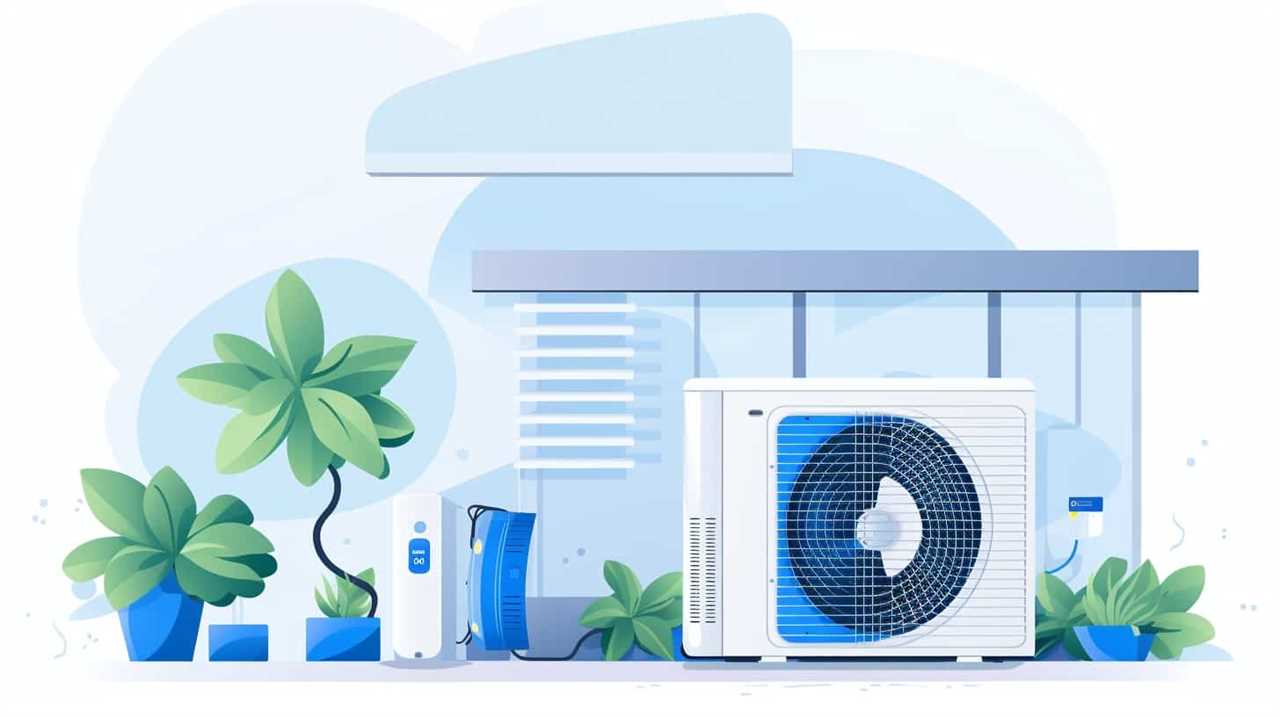
Lastly, the brand reputation and warranty offered by the manufacturer can influence the price.
Considering these factors and seeking out reputable and affordable installation services is essential for making an informed decision.
Understanding the Cost of Air Conditioning Heat Pump Installation
We have identified three key factors that contribute to the cost of air conditioning heat pump installation:
-
The size and complexity of the system: This is determined by the square footage of the area to be cooled and the number of rooms or zones that need to be controlled. A larger system or one with more advanced features will generally cost more.

-
The quality of the equipment: This also affects the price, as higher efficiency units tend to be more expensive upfront but can save on energy costs in the long run.
-
The labor involved: This includes any necessary modifications to the existing infrastructure and will contribute to the overall cost.
It’s important to consider the long-term benefits of air conditioning heat pump installation, such as increased energy efficiency and improved comfort, when evaluating the cost.
Comparing Air Conditioning Heat Pump Brands and Prices
As we compare air conditioning heat pump brands and prices, it’s important to consider factors such as energy efficiency, reliability, and warranty coverage. These factors can greatly impact the long-term cost and satisfaction of owning an air conditioning heat pump.

Here are four key considerations when comparing different brands and their prices:
-
Energy efficiency: Look for models that have a high SEER (Seasonal Energy Efficiency Ratio) rating. Higher SEER ratings indicate better energy efficiency and lower operating costs over time.
-
Reliability: Research customer reviews and ratings to determine the reliability of different brands. A reliable air conditioning heat pump will require fewer repairs and have a longer lifespan.
-
Warranty coverage: Check the warranty options offered by each brand. A comprehensive warranty can provide peace of mind and protect against unexpected repair costs.

-
Price: Compare the prices of different brands, taking into account the energy efficiency and warranty coverage. It’s important to find a balance between upfront cost and long-term savings.
Hidden Costs to Consider When Installing an Air Conditioning Heat Pump
Before making a decision, it’s important for us to be aware of the hidden costs associated with installing an air conditioning heat pump.
While the upfront price of the heat pump itself is a significant consideration, there are other expenses to keep in mind. One of these is the hidden installation fees. These fees can vary depending on factors such as the complexity of the installation, the location of the unit, and any additional work that may be required. It’s crucial to obtain a detailed quote from the installer to understand the full cost of the installation.
Another factor to consider is the long-term energy savings that can be achieved with an air conditioning heat pump. While the initial investment may be higher, the efficiency of the heat pump can lead to substantial savings on energy bills over time.

It’s essential to weigh these hidden costs against the potential long-term benefits before making a decision.
How to Budget for Air Conditioning Heat Pump Installation
When it comes to budgeting for air conditioning heat pump installation, there are a few cost-saving installation tips that can help keep expenses down.
One option is to consider financing options available, such as low-interest loans or payment plans, which can make the upfront costs more manageable.
Cost-Saving Installation Tips
We should consider three cost-saving installation tips to help us budget for air conditioning heat pump installation.

-
Choose cost-effective options: When selecting an air conditioning heat pump, consider the initial cost, as well as long-term savings. Look for models that offer energy efficiency and lower maintenance costs. Additionally, consider purchasing from reputable manufacturers that offer warranties and after-sales support.
-
Optimize installation location: Proper placement of the heat pump can significantly impact its efficiency and overall performance. Ensure that the unit is installed in a shaded area to reduce the load on the system and prevent unnecessary strain. Additionally, avoid areas with high humidity or excessive dust accumulation, as this can affect the heat pump’s longevity.
-
Seek professional installation services: Hiring a professional for installation ensures that the process is done correctly, minimizing the risk of errors or damage. They can also provide expert advice on optimizing the system’s performance and efficiency.
Financing Options Available
Let’s explore the financing options available to help us budget for air conditioning heat pump installation.
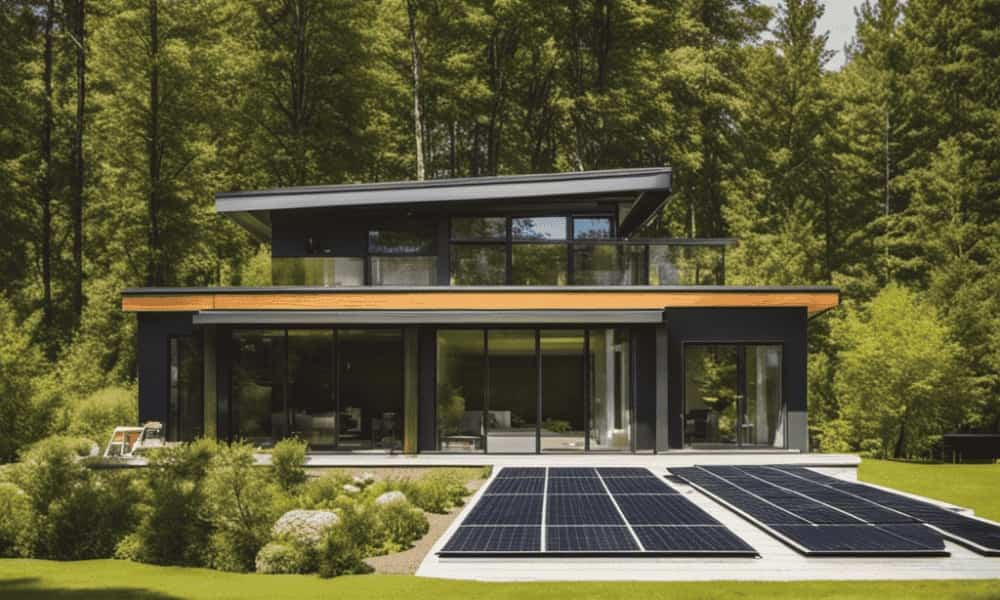
When it comes to paying for the installation of an air conditioning heat pump, there are several payment options to consider. Many HVAC companies offer financing programs that allow customers to spread the cost of the installation over a period of time. These programs often come with competitive interest rates, making it more affordable for homeowners to invest in a new system. Some financing options may even offer promotional periods with low or zero interest rates, providing additional savings.
By utilizing these payment options, homeowners can better manage their budgets and avoid the upfront costs of installation.
Now that we understand the financing options available, let’s move on to the next section where we’ll discuss tips for finding affordable air conditioning heat pump installation services.
Tips for Finding Affordable Air Conditioning Heat Pump Installation Services
Finding affordable air conditioning heat pump installation services can be a challenge. When searching for the best installation services at a reasonable price, consider the following tips:

-
Compare quotes from multiple service providers: Request quotes from different installation companies to compare prices and services offered. This will help you find the most affordable option that meets your requirements.
-
Seek recommendations: Ask friends, family, or neighbors who’ve recently installed air conditioning heat pumps for recommendations on affordable and reliable installation services.
-
Look for special offers or discounts: Keep an eye out for special promotions or discounts offered by installation companies. These can provide an opportunity to save money on the installation cost.
-
Consider DIY installation: If you have the necessary skills and knowledge, opting for a DIY installation can save you a significant amount of money. However, ensure that you’re confident in your abilities before attempting this option.

Financing Options for Air Conditioning Heat Pump Installation
When it comes to financing options for air conditioning heat pump installation, there are two main choices to consider: obtaining a loan or leasing the equipment. Both options have their pros and cons, and it’s important to carefully evaluate them based on your specific circumstances.
Additionally, credit requirements may vary depending on the financing option you choose, so it’s crucial to check your credit score and history beforehand.
Lastly, it’s worth exploring the payment plans offered by different lenders or leasing companies to find one that aligns with your budget and preferences.
Loan Vs. Lease
We’ve compared the pros and cons of loan and lease options to finance the installation of an air conditioning heat pump. Here’s a breakdown of each option:
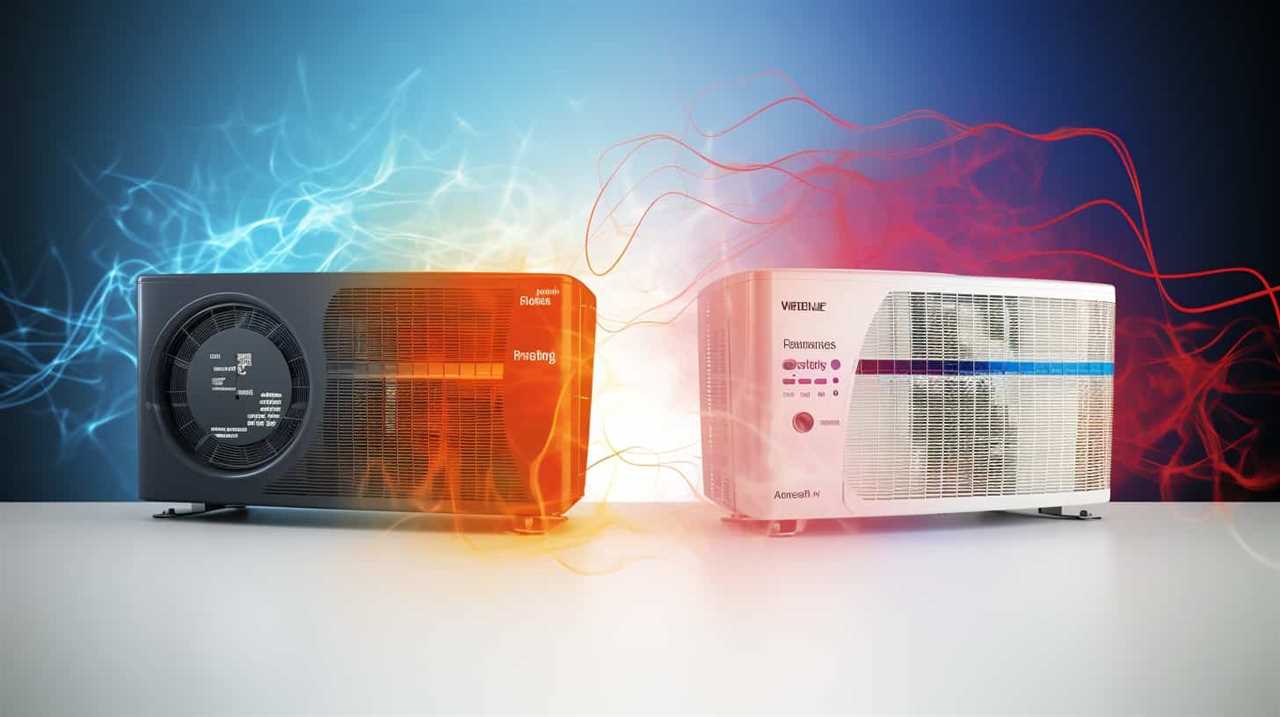
-
Loan options: Taking out a loan allows you to own the heat pump outright. With a loan, you make monthly payments towards the principal and interest. This option gives you the flexibility to choose the loan term and interest rate that best fits your budget.
-
Lease agreements: Leasing a heat pump means you don’t own it, but you have the right to use it for a specified period. Lease agreements typically come with lower upfront costs and maintenance responsibilities. However, you won’t build equity in the equipment and may have restrictions on customization.
-
Flexibility: Loans offer more flexibility in terms of equipment choices and customization options. With a lease, you may have limited options for equipment selection and modifications.
-
Long-term costs: While loans may have higher upfront costs, in the long run, you’ll own the equipment and benefit from reduced energy bills. Leases may have lower upfront costs, but you’ll have ongoing monthly payments and may not experience the same energy savings.

Considering the pros and cons of loan and lease options, it’s important to evaluate your financial situation and long-term goals before making a decision.
Now, let’s dive into the credit requirements for financing an air conditioning heat pump installation.
Credit Requirements
To finance the installation of an air conditioning heat pump, our credit requirements and available financing options must be considered. When it comes to credit requirements, lenders typically evaluate factors such as credit score, income, and debt-to-income ratio. A good credit score and stable income will increase your chances of securing favorable financing options for your air conditioning heat pump installation. Speaking of financing options, let’s take a look at the table below to understand the different options available:
| Financing Option | Description | Pros |
|---|---|---|
| Personal Loan | A loan obtained from a bank or credit union for the specific purpose of financing your air conditioning heat pump installation. | Flexible repayment terms, lower interest rates compared to credit cards. |
| Manufacturer Financing | Financing options offered by the manufacturer of the air conditioning heat pump. | Special promotions or discounts, may have more lenient credit requirements. |
| Home Equity Loan | A loan that allows you to borrow against the equity in your home. | Potentially tax-deductible interest, longer repayment terms. |
Payment Plans Offered
By exploring the available financing options, we can find payment plans that suit our budget for air conditioning heat pump installation. Here are four financing options to consider:

-
Traditional Bank Loan: This option allows us to borrow a specific amount of money from a bank to finance our air conditioning heat pump installation. We’ll need to repay the loan over a fixed period of time with interest.
-
Manufacturer Financing: Some air conditioning heat pump manufacturers offer financing options directly to customers. These financing plans may come with competitive interest rates and flexible repayment terms.
-
Lease-to-Own: With a lease-to-own option, we can lease the air conditioning heat pump and have the option to purchase it at the end of the lease term. This option may be beneficial for those who prefer lower monthly payments initially.
-
Home Equity Line of Credit (HELOC): If we’ve equity in our home, we can use a HELOC to finance our air conditioning heat pump installation. This option allows us to borrow against the equity in our home and typically offers lower interest rates than other financing options.

Saving Money on Air Conditioning Heat Pump Maintenance and Repairs
Our best strategy for saving money on air conditioning heat pump maintenance and repairs is to perform regular inspections and cleanings. By conducting routine inspections, we can identify any potential issues early on and address them before they become major problems. This can help prevent costly repairs down the line.
Additionally, regular cleanings of the air conditioning heat pump can improve its efficiency and prolong its lifespan. Cleaning the coils, filters, and condensate drain can ensure that the heat pump operates at its optimal level, reducing energy consumption and saving money on utility bills.
It’s also important to check and tighten any loose electrical connections, as they can lead to performance issues or even system failure. Following these maintenance tips can help homeowners save money and keep their air conditioning heat pumps running smoothly.
Frequently Asked Questions
Are There Any Government Incentives or Tax Credits Available for Purchasing and Installing an Air Conditioning Heat Pump?
Yes, there are government incentives and tax credits available for purchasing and installing an air conditioning heat pump. These include government tax incentives and energy efficiency rebates that can help offset the cost of the system.
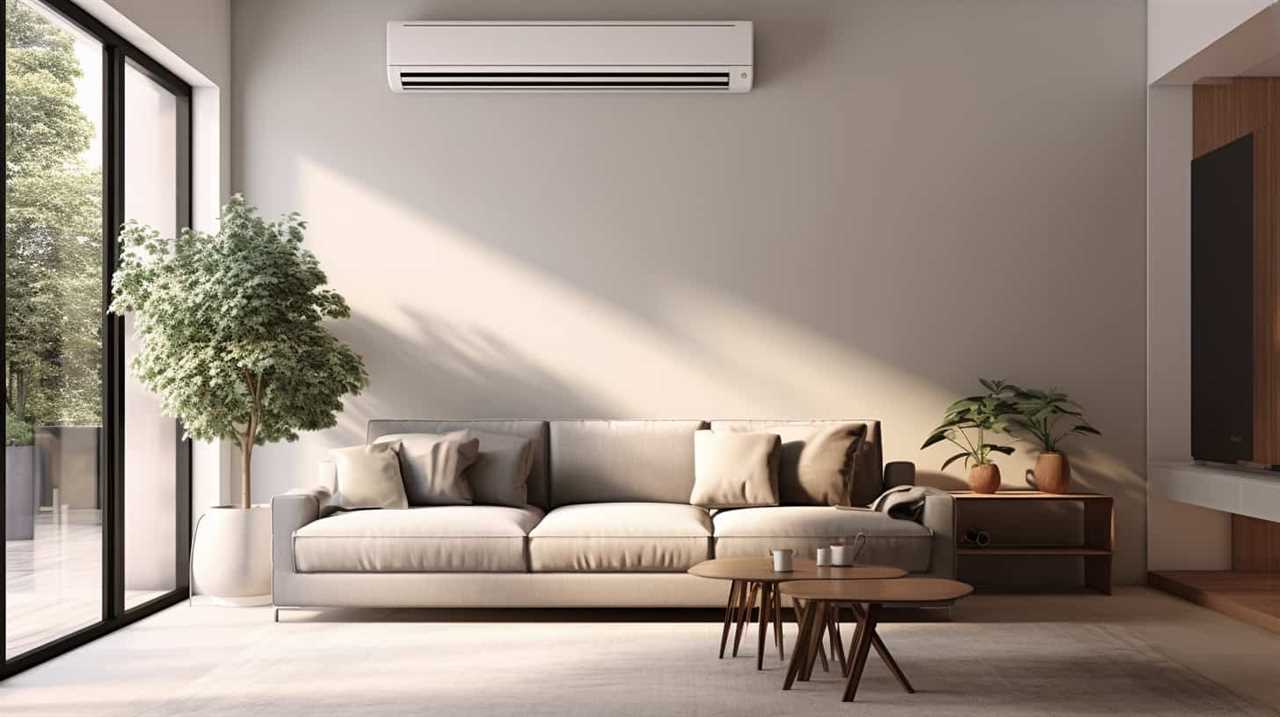
What Is the Average Lifespan of an Air Conditioning Heat Pump?
The average lifespan of an air conditioning heat pump can vary, but it is typically around 15-20 years. Regular maintenance, such as cleaning the filters and coils, can help prolong its lifespan.
Can I Install an Air Conditioning Heat Pump Myself, or Is Professional Installation Required?
We can choose to install an air conditioning heat pump ourselves, but professional installation is recommended. DIY installation may save money, but professional installation ensures proper setup and performance, minimizing potential risks and maximizing efficiency.
How Can I Determine the Right Size Air Conditioning Heat Pump for My Home?
To determine the right size air conditioning heat pump for our home, we need to consider factors such as square footage, insulation, and climate. Proper sizing ensures optimal performance and energy efficiency, resulting in lower maintenance costs and greater comfort.
Are There Any Energy-Saving Features or Technologies That I Should Look for When Choosing an Air Conditioning Heat Pump?
When choosing an air conditioning heat pump, it’s important to consider energy-efficient technologies and the benefits of smart thermostats. These features can help reduce energy consumption and lower utility bills.

Conclusion
In conclusion, if you want to unravel the mysterious world of air conditioning heat pump prices, just take a chill pill.
While the cost of installation and maintenance may cause some sweat to form on your brow, there are ways to keep your cool.
By understanding the factors that affect prices, comparing brands, and considering hidden costs, you can budget wisely and find affordable installation services.
So don’t let the heat get to you, stay cool and save some cash!
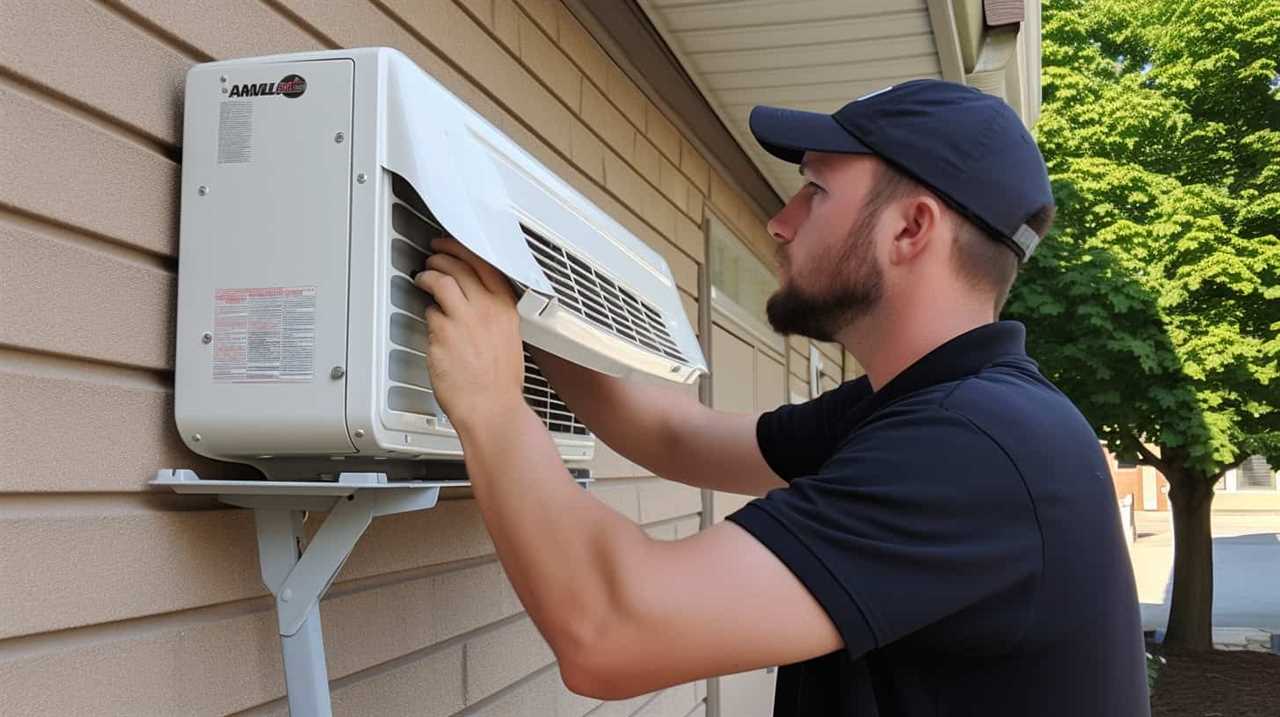
Air Conditioning
What Are the Top Energy-Efficient Heat Pump Acs

We have found the top energy-efficient heat pump air conditioners that are revolutionizing the way we cool our homes.
Did you know that these advanced units can reduce energy consumption by up to 50% compared to traditional air conditioners?
In this article, we’ll explore the top brands in the market and share essential factors to consider when choosing an energy-efficient heat pump AC.
Get ready to embrace innovation and maximize your cooling efficiency with these cutting-edge systems.
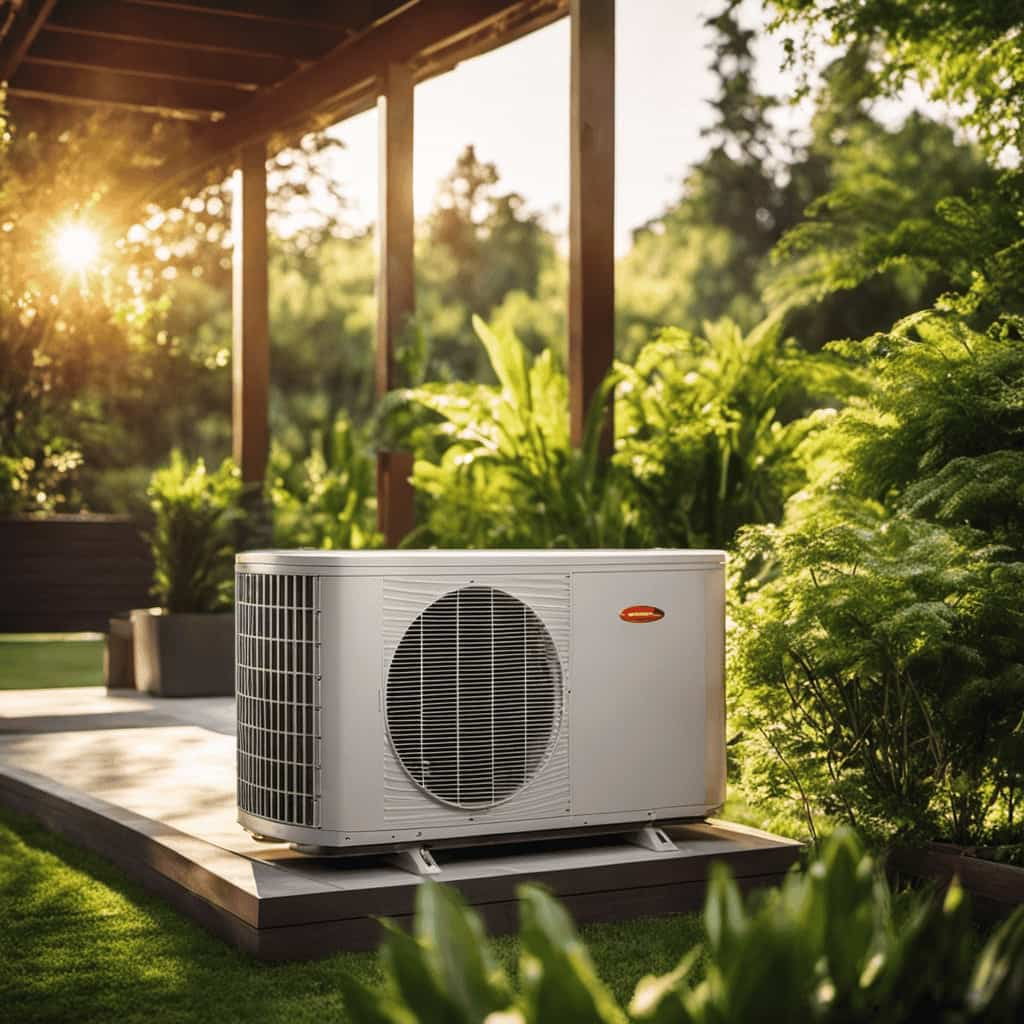
Key Takeaways
- Energy-Efficient Heat Pump ACs can reduce energy consumption by up to 50% compared to traditional air conditioners, leading to significant savings on electricity bills.
- The SEER rating of a heat pump AC is an important factor to consider, as higher SEER ratings indicate greater energy efficiency.
- It is crucial to choose the right size heat pump AC for optimal energy efficiency, avoiding units that are either too small or oversized.
- Trane and Carrier are top brands in the market that offer reliable and sustainable cooling and heating solutions, prioritizing innovation and efficiency.
Benefits of Energy-Efficient Heat Pump ACs
We love energy-efficient heat pump ACs because they save us money on our electricity bills. These advanced systems utilize cutting-edge energy-saving technology, allowing us to reduce our energy consumption without sacrificing comfort.
By using less electricity, we can significantly lower our monthly utility costs, resulting in substantial long-term cost savings. Energy-efficient heat pump ACs are designed to operate at optimal efficiency levels, maximizing the cooling and heating output while minimizing energy waste.
This innovative technology not only benefits our wallets but also helps protect the environment by reducing our carbon footprint.
When considering the purchase of an energy-efficient heat pump AC, it’s crucial to evaluate factors such as energy efficiency ratings, capacity, and compatibility with our home’s existing HVAC system. Making an informed decision ensures that we can fully enjoy the benefits of energy-efficient cooling and heating while maximizing our cost savings.
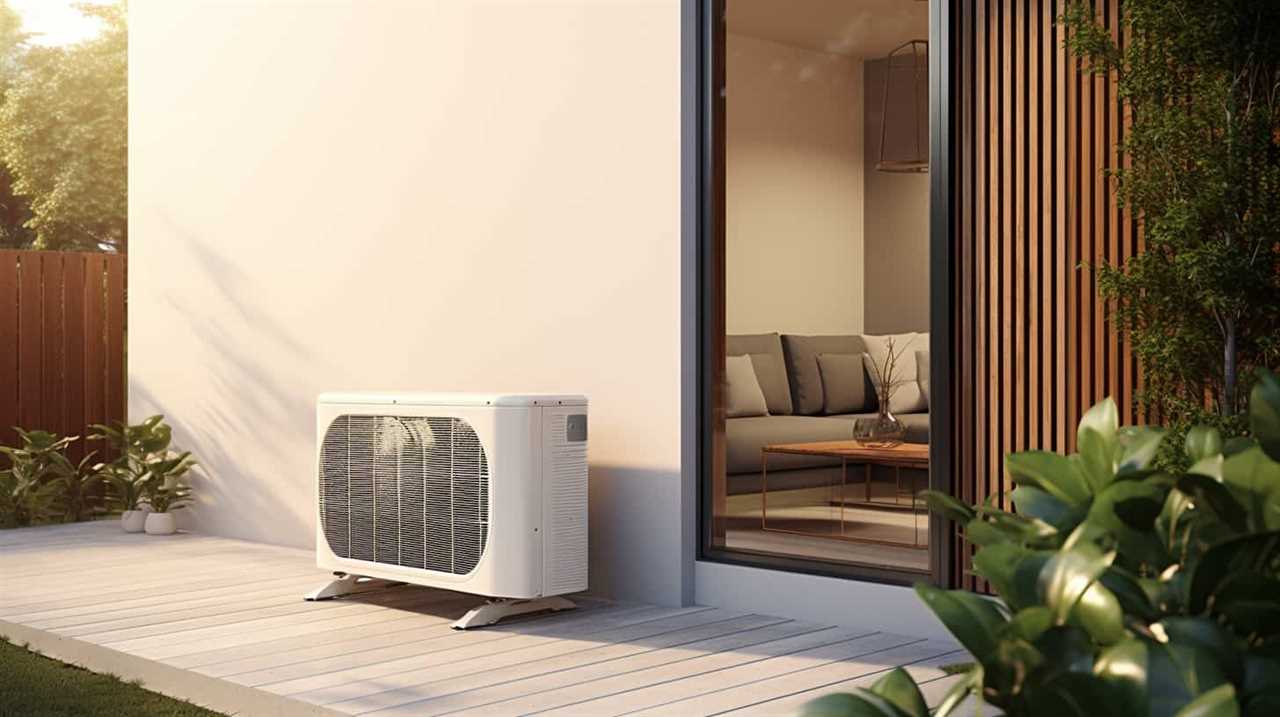
Factors to Consider When Choosing an Energy-Efficient Heat Pump AC
Two key factors to consider when choosing an energy-efficient heat pump AC are the SEER rating and the size of the unit.
-
SEER rating: The Seasonal Energy Efficiency Ratio (SEER) measures the cooling efficiency of an AC unit. Higher SEER ratings indicate greater energy efficiency, resulting in lower energy consumption and cost savings over time. Look for units with SEER ratings of 14 or higher for optimal energy efficiency.
-
Size of the unit: Choosing the right size is crucial for energy efficiency. A unit that’s too small will struggle to cool the space efficiently, while an oversized unit will cycle on and off frequently, wasting energy. It’s important to have a professional assess the cooling needs of your space and recommend the appropriate size.
Considering these factors won’t only ensure cost-effective options for energy-efficient heat pump ACs but also minimize the environmental impact of your cooling system.

Top Energy-Efficient Heat Pump AC Brands in the Market
Among the top energy-efficient heat pump AC brands in the market, Trane and Carrier stand out for their innovative technology and high-performance units. These brands offer a range of top rated heat pump AC models that provide both efficient cooling and heating, making them a cost effective heat pump AC option for consumers. Trane is known for its advanced ComfortLink™ II communicating technology, which allows the system components to automatically communicate and optimize performance. Carrier, on the other hand, offers the Infinity® Series heat pumps that deliver precise temperature control and enhanced energy efficiency. Both brands prioritize innovation and efficiency to provide customers with reliable and sustainable cooling and heating solutions.
| Brand | Technology | Energy Efficiency |
|---|---|---|
| Trane | ComfortLink™ II | High |
| Carrier | Infinity® Series | High |
Table 1: Comparison of Energy-Efficient Heat Pump AC Brands
These top energy-efficient heat pump AC brands offer cutting-edge technology and high energy efficiency ratings, making them a smart choice for consumers seeking innovative cooling and heating solutions.
Features to Look for in an Energy-Efficient Heat Pump AC
Our focus now shifts to the features to look for in an energy-efficient heat pump AC. When searching for the perfect unit, keep these key features in mind:
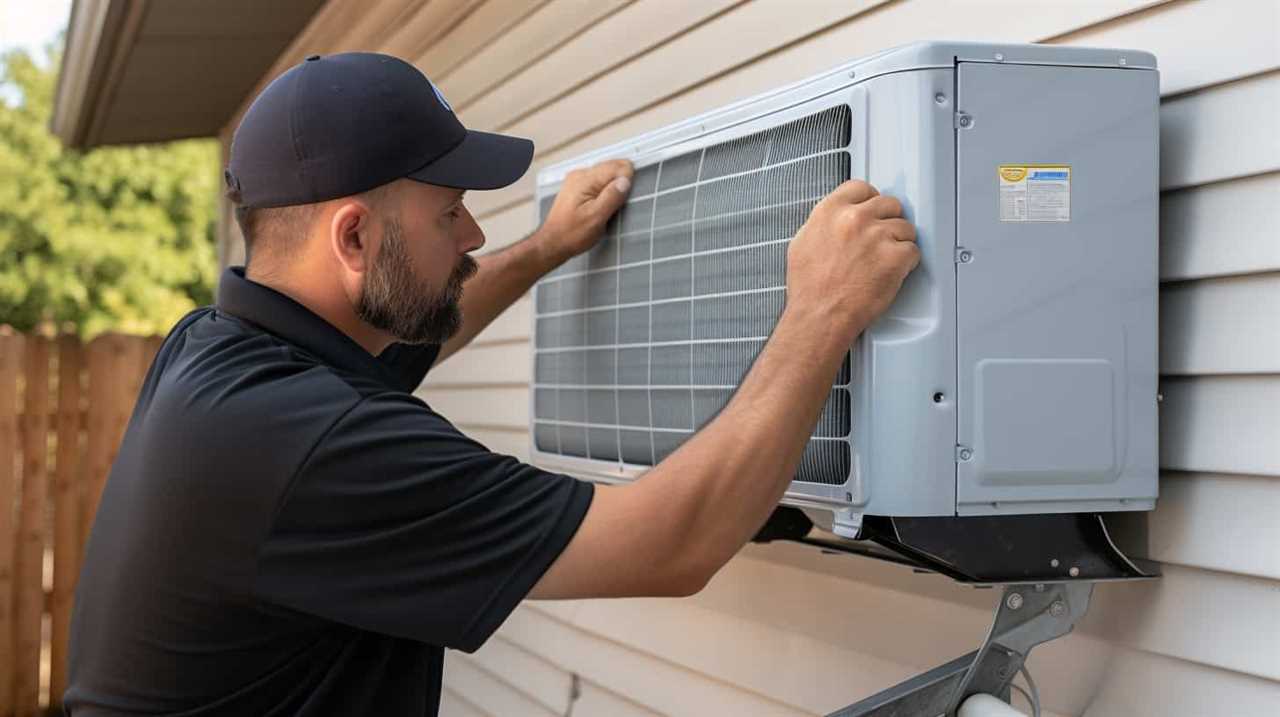
-
Energy-saving technology: Look for heat pump ACs that utilize advanced energy-saving technology. This can include features like variable speed compressors, which adjust the cooling output to match the specific needs of your home, resulting in reduced energy consumption.
-
Cost-effective cooling: Opt for a heat pump AC that offers cost-effective cooling. Look for units with high energy efficiency ratios (EER) and seasonal energy efficiency ratios (SEER), as these indicate how efficiently the unit can cool your space while minimizing energy usage and costs.
-
Smart thermostat compatibility: Consider heat pump ACs that are compatible with smart thermostats. This allows you to easily control and monitor your cooling system remotely, optimizing energy usage and comfort levels.
-
Zoning capabilities: Look for units that offer zoning capabilities, allowing you to independently control the temperature in different areas of your home. This feature ensures that you only cool the areas that need it, saving energy and reducing costs.

Tips for Maximizing Energy Efficiency With Heat Pump ACs
To maximize energy efficiency with heat pump ACs, we can follow these tips.
-
Utilize energy-saving techniques such as setting the thermostat to a moderate temperature and using the ‘energy saver’ mode. This reduces the workload on the heat pump and saves energy.
-
Ensure proper maintenance of the heat pump AC. Regularly clean or replace the air filters to improve airflow and system efficiency. Keep the outdoor unit clear of debris and vegetation to optimize heat exchange.
-
Additionally, schedule professional maintenance at least once a year to check for refrigerant leaks, inspect electrical connections, and calibrate the system.
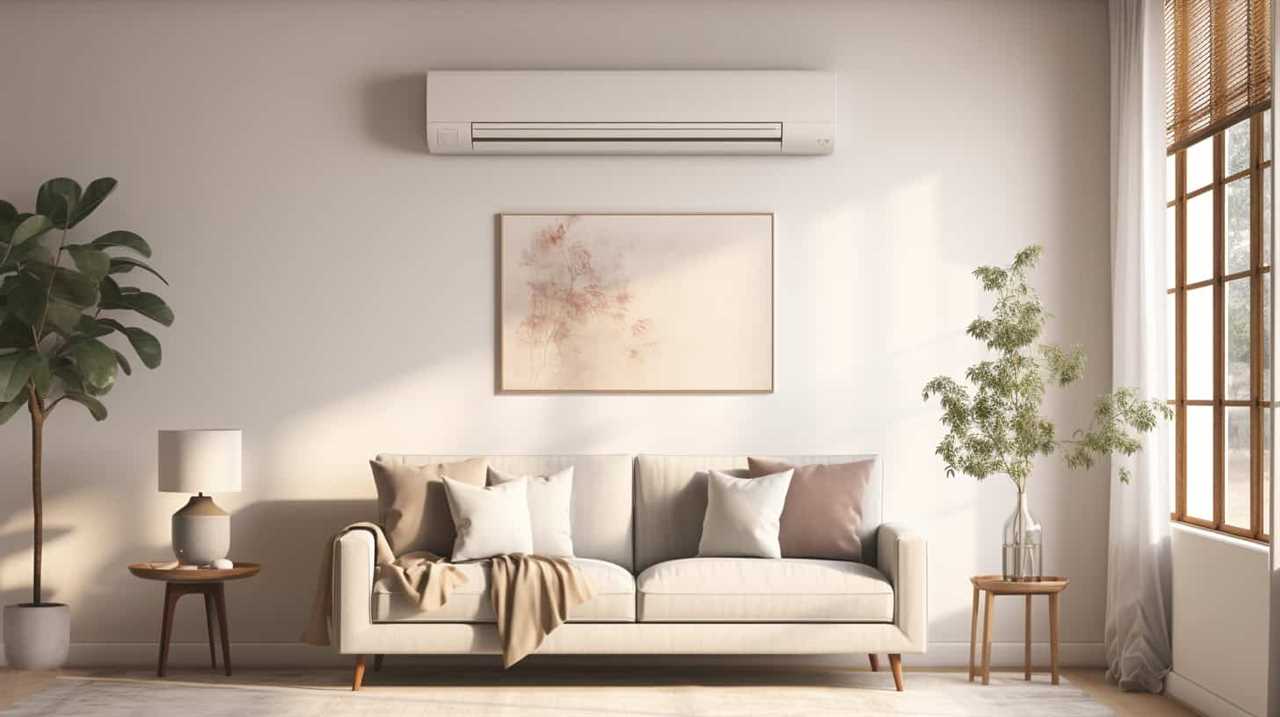
Frequently Asked Questions
How Much Money Can I Expect to Save on My Energy Bills by Using an Energy-Efficient Heat Pump Ac?
By using an energy-efficient heat pump AC instead of a traditional AC, we can expect to save a significant amount of money on our energy bills. The benefits of an energy-efficient heat pump AC include increased efficiency and reduced energy consumption.
Are There Any Tax Incentives or Rebates Available for Purchasing an Energy-Efficient Heat Pump Ac?
Yes, there are tax incentives and rebates available for purchasing an energy-efficient heat pump AC. These incentives can help offset the initial cost and encourage energy savings in the long run.
Can I Use an Energy-Efficient Heat Pump AC in Colder Climates?
Yes, you can use energy-efficient heat pump ACs in colder climates. They have the advantage of providing both cooling and heating, making them suitable for regions with varying temperatures.
How Long Does an Energy-Efficient Heat Pump AC Typically Last?
Heat pump ACs typically last for around 15-20 years. However, with proper maintenance, they can surpass this range. Regular maintenance can also help reduce the overall maintenance cost and ensure their longevity.
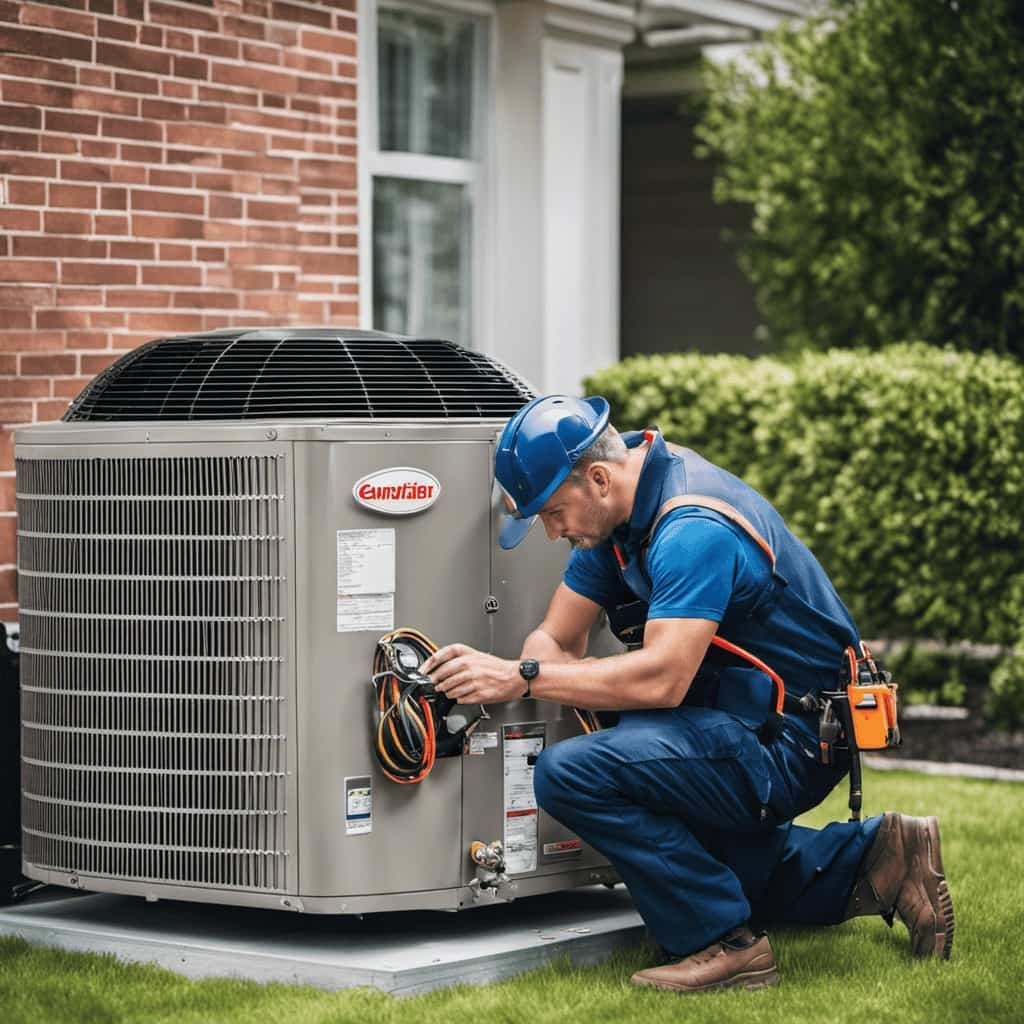
Are There Any Maintenance Requirements for Energy-Efficient Heat Pump Acs?
There are maintenance requirements for energy-efficient heat pump ACs. Regular filter cleaning, coil inspection, and refrigerant level checks are necessary to ensure optimal performance and maximize the benefits of these innovative systems.
Conclusion
In conclusion, choosing an energy-efficient heat pump AC can significantly reduce energy consumption and lower utility bills. By investing in top brands and considering important factors such as SEER ratings and size, consumers can make a smart choice.
Features like programmable thermostats and variable speed compressors further enhance the efficiency of these systems. By following tips for maximizing energy efficiency, individuals can create a comfortable and eco-friendly living space while saving money in the long run.
Air Conditioning
Your Guide: Installing a Heat Pump for AC

Are you looking for a way to beat the heat this summer and save on your energy costs? Interested in learning about installing a heat pump for air conditioning? Look no further, as we have the ultimate guide for you here.
Are you ready to revolutionize your cooling system? With our step-by-step process and expert tips, you’ll be well on your way to a more efficient and comfortable home.
Let’s dive in and discover the ins and outs of heat pump installation!
Key Takeaways
- Heat pumps transfer heat from one location to another and can provide both heating and cooling.
- Assessing the home’s cooling needs involves considering factors such as size, insulation, and climate, as well as evaluating the efficiency and maintenance requirements of heat pumps.
- Choosing the right heat pump size is important to ensure energy efficiency and minimize maintenance issues.
- Preparing the home for heat pump installation involves gathering necessary tools and materials, addressing insulation requirements, meeting electrical requirements, and preparing the outdoor area for installation.
Understanding Heat Pumps: A Brief Overview
Let’s start by understanding how heat pumps work and their key components. Heat pumps are innovative systems that use a small amount of energy to transfer heat from one location to another. They work by extracting heat from the air or ground outside your home and transferring it indoors during the colder months. In the summer, the process is reversed, and heat is extracted from the indoor air and released outside, providing cooling. This efficient mechanism allows heat pumps to provide both heating and cooling, making them versatile and cost-effective.
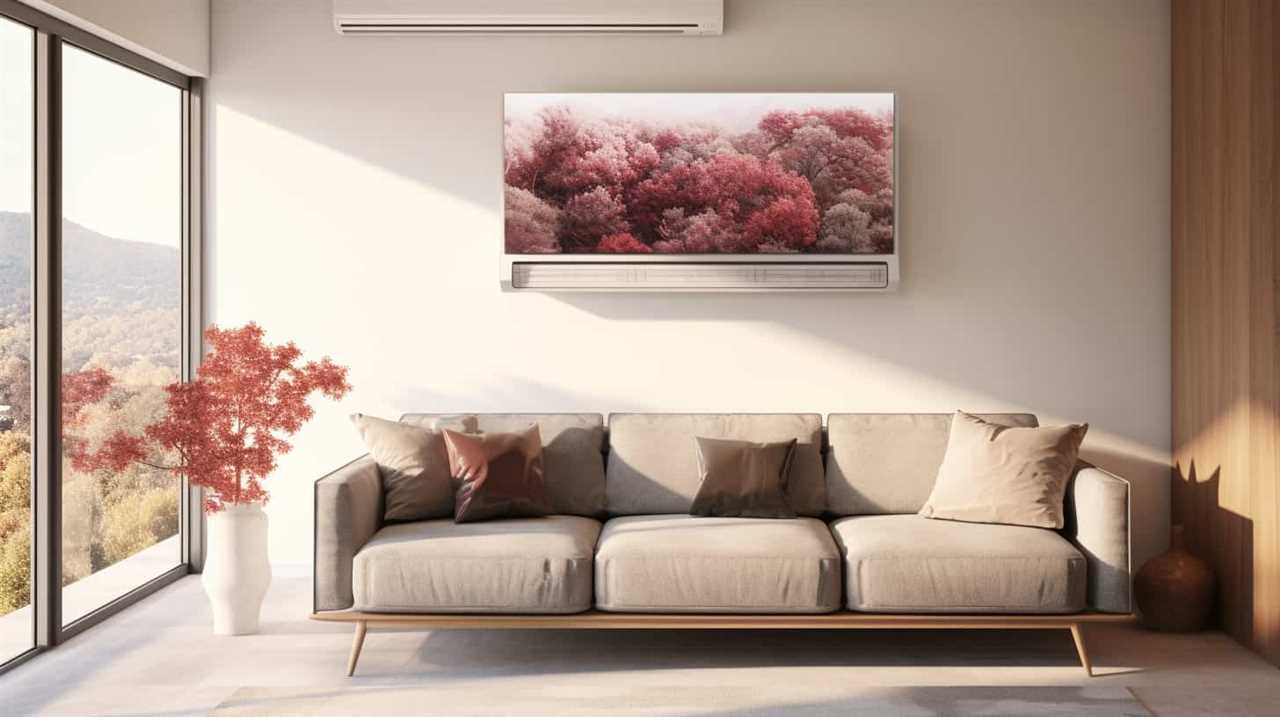
The benefits of heat pumps include energy efficiency, lower utility bills, and reduced environmental impact. Now that we’ve a basic understanding of heat pump mechanics and their advantages, let’s move on to assessing your home’s cooling needs.
Assessing Your Home’s Cooling Needs
To accurately determine our home’s cooling needs, we need to consider factors such as the size of our space, insulation levels, and the climate we live in.
Evaluating the efficiency of a heat pump is crucial in determining its ability to effectively cool our home. Heat pumps with higher Seasonal Energy Efficiency Ratios (SEER) are more efficient and can provide greater energy savings.
Additionally, we should also assess the maintenance requirements of the heat pump. Some models may require regular filter changes or annual professional maintenance to ensure optimal performance.
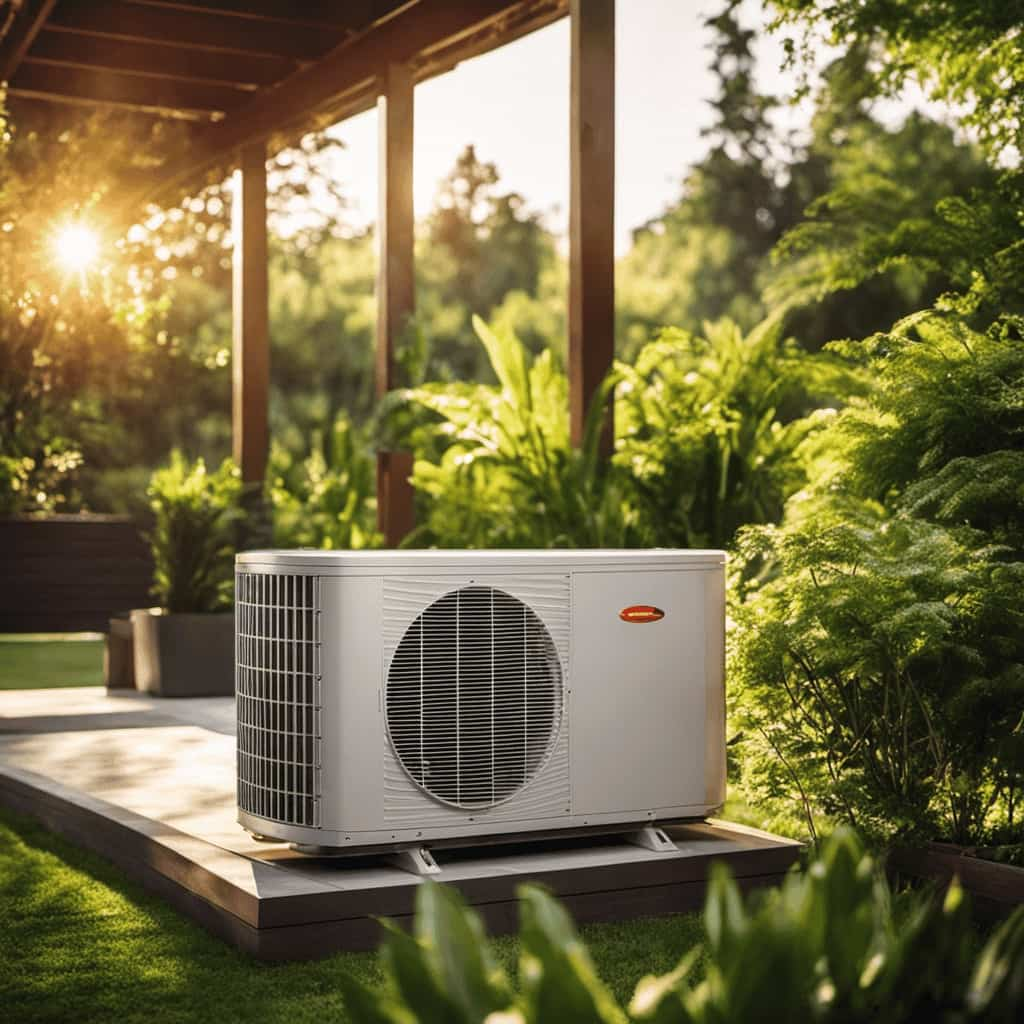
By evaluating these factors, we can choose a heat pump that meets our cooling needs while maximizing efficiency and minimizing maintenance requirements.
This will ensure a comfortable and cost-effective cooling solution for our home.
Choosing the Right Heat Pump Size
Determining the appropriate heat pump size involves calculating the square footage of our home and considering factors such as insulation, climate, and desired temperature. To ensure optimal heat pump efficiency, it’s crucial to choose a size that matches our specific cooling needs.
Oversized units can lead to frequent on-off cycling, causing unnecessary wear and tear on the system and reducing its lifespan. On the other hand, undersized units may struggle to cool the space efficiently, resulting in inadequate comfort and increased energy consumption.
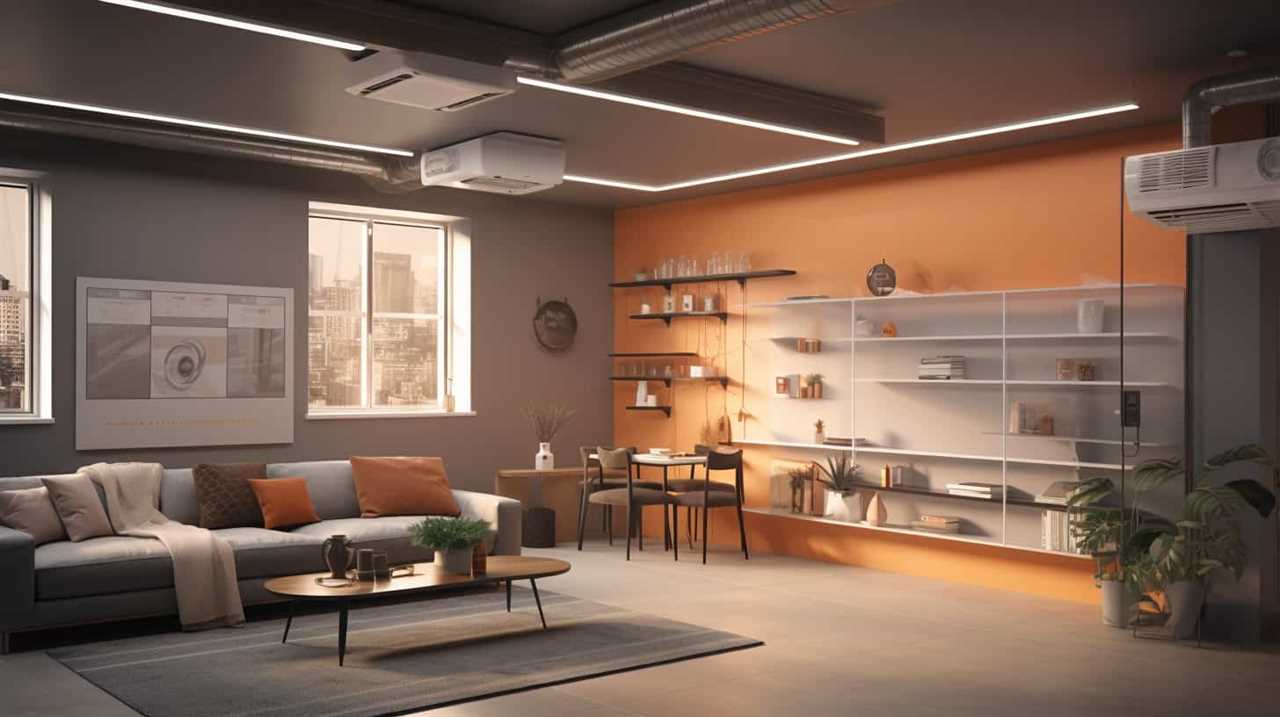
To find the right size, we can consult a professional HVAC technician who can perform a load calculation based on our home’s unique characteristics. This calculation takes into account factors like insulation levels, window efficiency, and local climate conditions. By selecting the correct heat pump size, we can maximize energy efficiency and minimize the need for future maintenance.
With the appropriate size determined, we can now move on to the next step of preparing our home for heat pump installation.
Preparing Your Home for Heat Pump Installation
We will need to gather all the necessary tools and materials before starting the heat pump installation process.
To ensure optimal performance and energy efficiency, it’s important to address insulation requirements in your home. Proper insulation will help prevent air leakage and maintain a comfortable indoor temperature. Inspect your attic, walls, and windows for any gaps or areas that may need additional insulation.
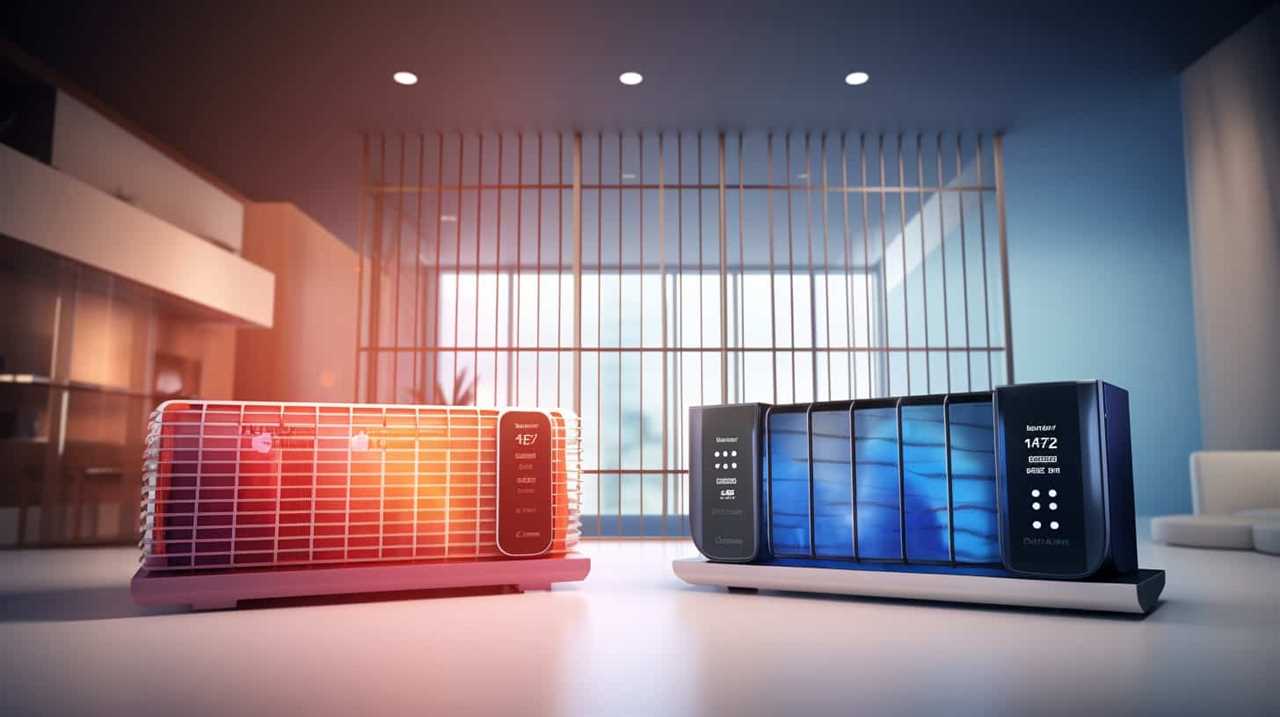
Additionally, it’s crucial to meet the electrical requirements for your heat pump installation. Consult with a licensed electrician to determine if your current electrical system can handle the load of the heat pump. If necessary, electrical upgrades may be needed to ensure safe and reliable operation.
Taking these steps will help prepare your home for a successful heat pump installation.
Step-by-Step Heat Pump Installation Process
First, we’ll begin by removing the old HVAC system and preparing the location for the new heat pump installation. This involves disconnecting the existing system, removing any ductwork, and ensuring the area is clean and ready for the new heat pump.
Once the area is prepared, we’ll begin the installation process. This includes mounting the heat pump unit outside, connecting the refrigerant lines, and installing the indoor unit. We’ll also need to connect the electrical wiring and thermostat.
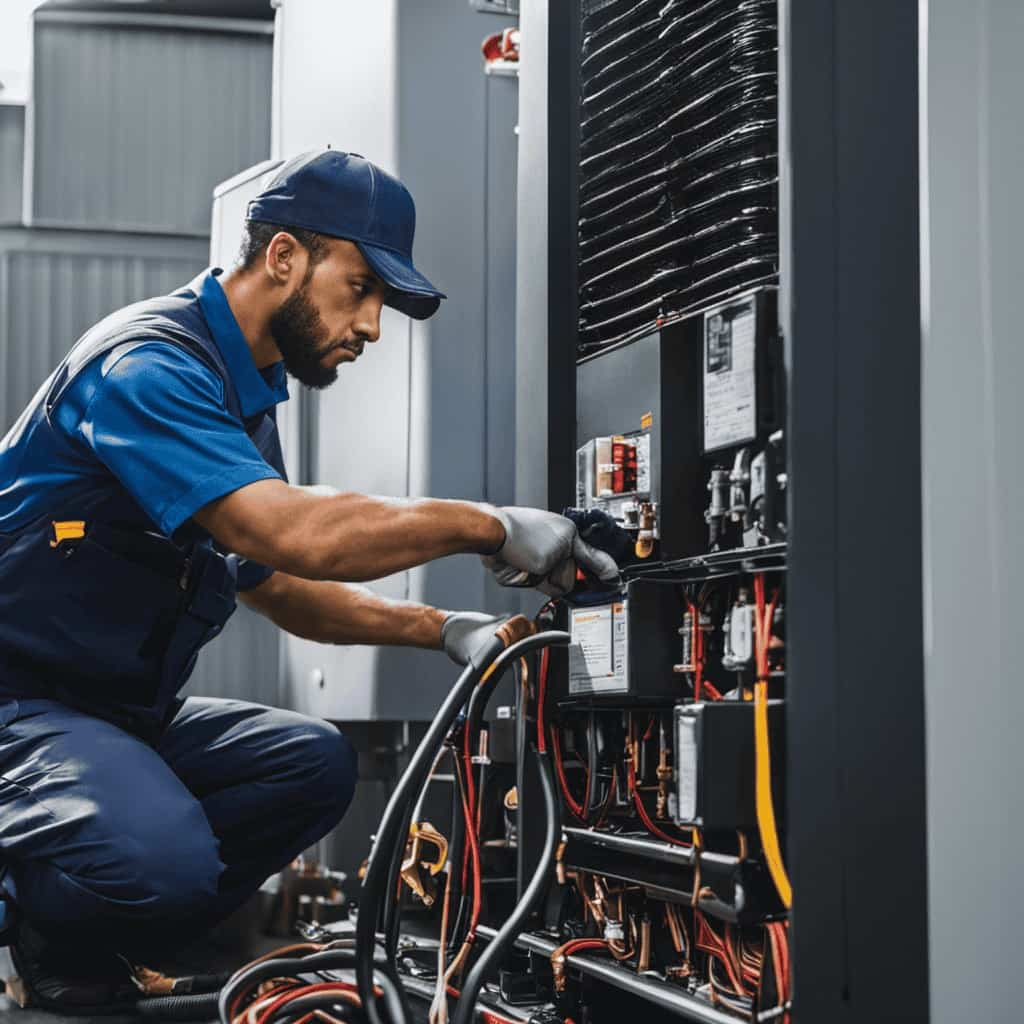
After the physical installation is complete, we’ll test the system to ensure it’s functioning properly. It’s important to note that regular heat pump maintenance is crucial for optimal performance. This includes cleaning or replacing filters, checking refrigerant levels, and troubleshooting any heat pump issues that may arise.
Frequently Asked Questions
What Is the Average Lifespan of a Heat Pump?
The average lifespan of a heat pump depends on various factors, such as maintenance requirements. It is important to regularly maintain your heat pump to ensure optimal performance and prolong its lifespan.
Are Heat Pumps Suitable for All Types of Homes?
Heat pumps are suitable for most homes due to their efficiency and cost savings. They can be installed in various types of homes, providing both heating and cooling capabilities.
How Often Should a Heat Pump Be Serviced?
Heat pump maintenance is crucial for optimal performance. Regular servicing ensures efficiency, prolongs lifespan, and minimizes breakdowns. Benefits include improved energy savings, enhanced comfort, and reduced environmental impact. Schedule annual maintenance to maximize the benefits.
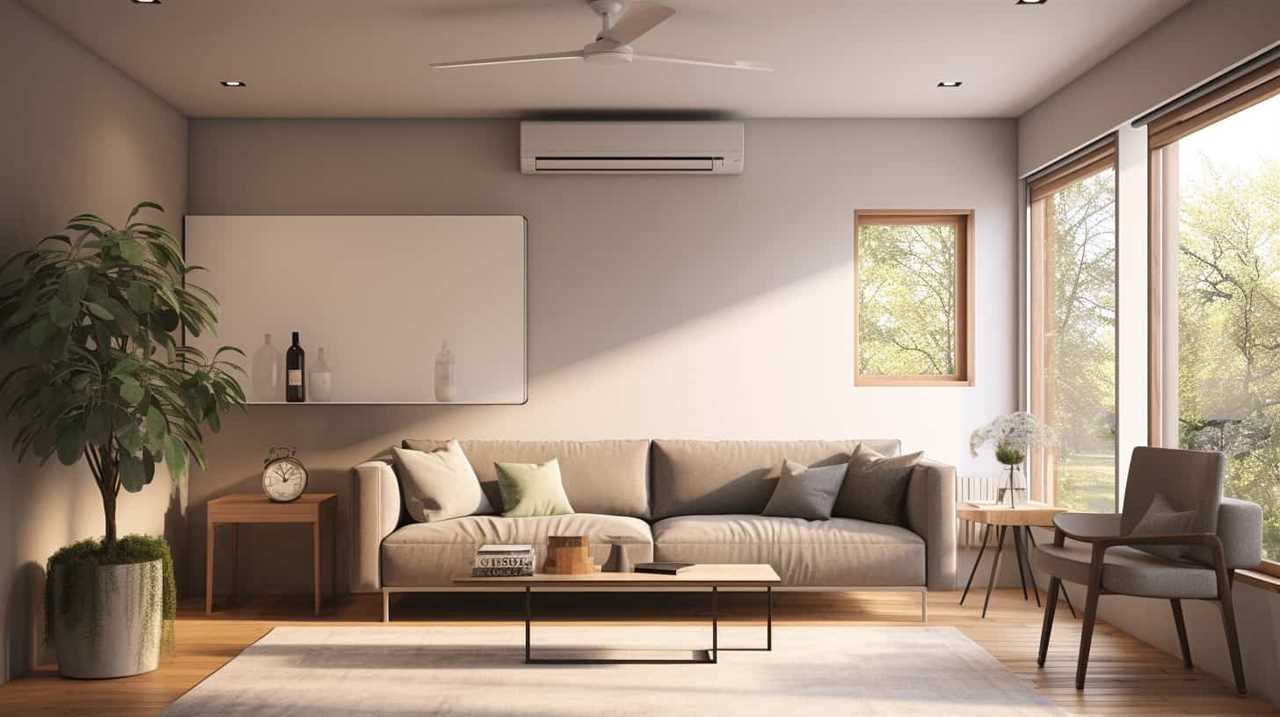
Can a Heat Pump Be Used as the Primary Heating Source in Colder Climates?
Yes, a heat pump can be used as the primary heating source in colder climates. It utilizes innovative technology to extract heat from the outside air and efficiently distribute it indoors, providing reliable and cost-effective warmth.
Are There Any Government Incentives or Rebates Available for Installing a Heat Pump?
There are government incentives available for installing a heat pump, providing significant energy savings and financial benefits. These incentives aim to promote innovation and encourage individuals to adopt more sustainable heating and cooling solutions.
Conclusion
So there you have it, folks. Installing a heat pump for AC is as easy as juggling flaming chainsaws while riding a unicycle on a tightrope. Just kidding!
But seriously, with the right knowledge and preparation, you can successfully install a heat pump and enjoy efficient cooling in your home. Remember to assess your cooling needs, choose the right size, and follow the step-by-step installation process.
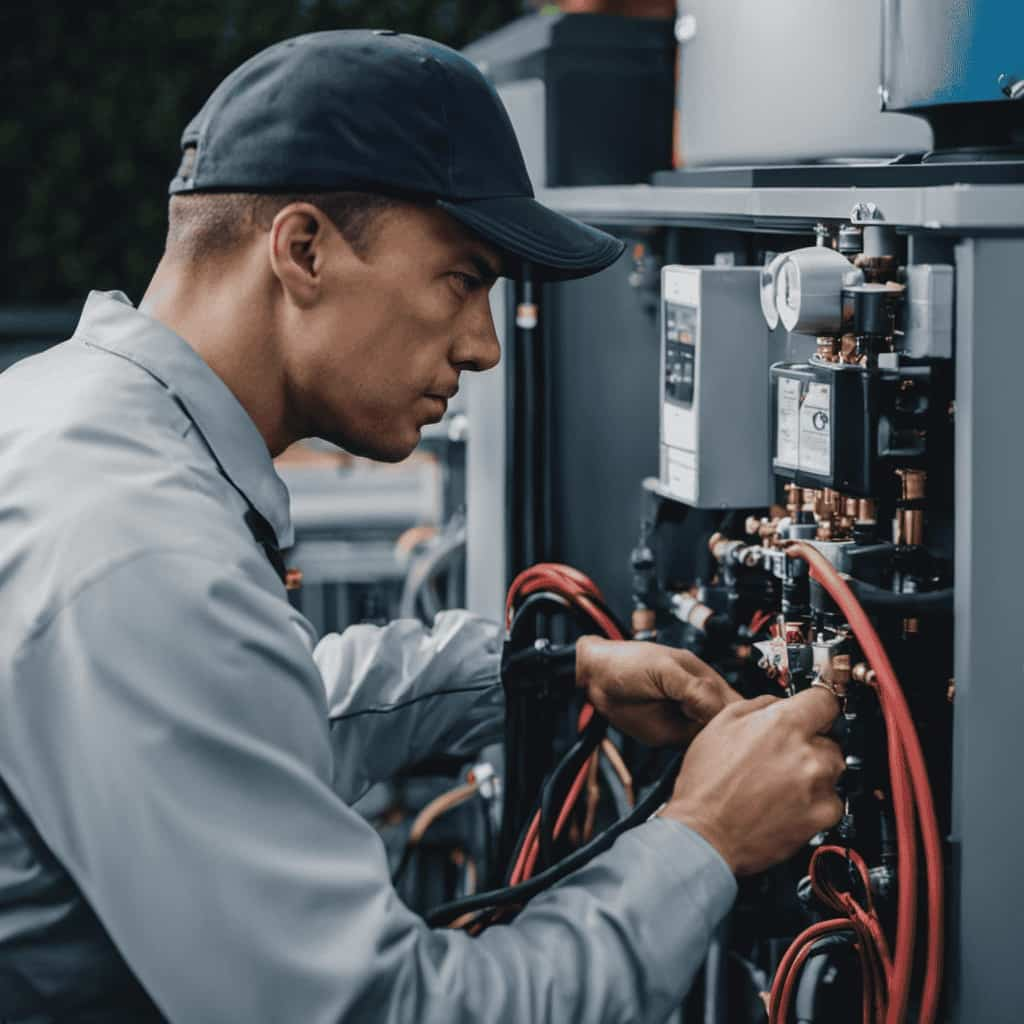
It’s like a thrilling rollercoaster ride, except without the screams and the fear of plummeting to your doom.
Happy cooling!
-

 Residential and Commercial Applications3 months ago
Residential and Commercial Applications3 months agoBest Amana Heat Pump Reviews
-

 Thermal Energy Transfer3 months ago
Thermal Energy Transfer3 months agoBreakthroughs in Modern Heat Pump Systems: Thermal Energy Edition
-

 Residential and Commercial Applications3 months ago
Residential and Commercial Applications3 months agoBest Heat Pump
-

 Geothermal Heat Pumps2 months ago
Geothermal Heat Pumps2 months agoUpgrade Your Comfort with Our Efficient HVAC Systems
-

 Geothermal Heat Pumps2 months ago
Geothermal Heat Pumps2 months agoInnovative Geothermal Heat Pump Manufacturers Revolutionize Energy Efficiency
-

 Air Conditioning4 weeks ago
Air Conditioning4 weeks agoExploring Energy-Efficient Air Conditioning Heat Pumps
-

 Thermal Energy Transfer3 months ago
Thermal Energy Transfer3 months agoBoost Your Heat Pump Efficiency: Interactive Guide
-

 Residential and Commercial Applications3 months ago
Residential and Commercial Applications3 months agoBest Portable Heat Pump Heat & AC











